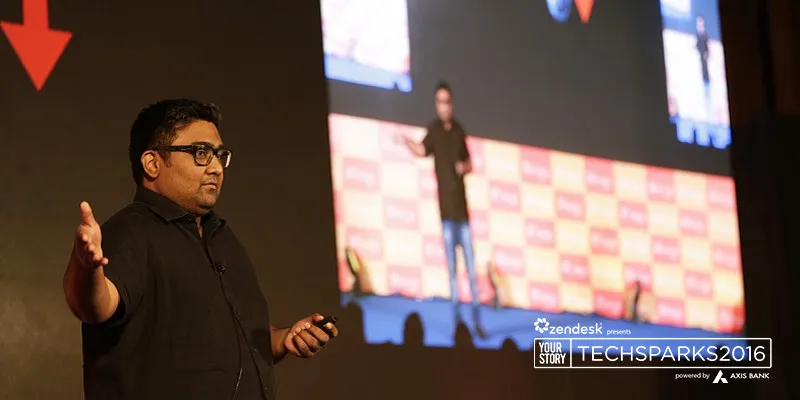What inefficiency are you trying to solve with your startup? Kunal Shah, Founder, FreeCharge
Which goods and services were more efficient 10 years ago? That is a difficult question to answer. This is because all efficiencies that have been created are for the future. And this is unique to human beings; they are hacking efficiency through different goods and services,
says Kunal Shah, Founder of FreeCharge, at the seventh edition of TechSparks.
The consumer today, however, goes through a million different painpoints. And these are more on the lines of 'how do I upload pictures quickly, get funding faster, or even get better scores in examinations'. "Every time you cross an inefficient phase and take consumers to higher levels of efficiency, you've created wealth," says Kunal.

Creating Delta 4
However, how do you know that you have moved away and created an efficiency? Many of us build things, and almost 99 percent of them fail. Citing the example of going to the railway ticketing counter and booking through IRCTC, Kunal says that in most cases customers do not go back to booking through a ticketing counter. The Delta in this case is more than four. "And every time you hit a Delta of four, you've hit the perfect efficiency scale," says Kunal.
Factors that ensure you have a Delta 4
- Once a Delta 4 is created, you do not go back to the previous inefficient system, whether it is booking an Ola or Uber or booking tickets and paying bills online.
- UBP v/s USP - While USP is a unique selling proposition, UBP is a unique brag-worthy proposition. Citing the example of TrueCaller, Kunal says that the TrueCaller app wasn't downloaded because of ads or any marketing, it was all word-of-mouth. "Everyone is trying to get you to move away from the inefficiency and those who have, brag about it to others who haven't," adds Kunal.
- High tolerance - While there are glitches, the user behaviour doesn't change. You might have faced problems with IRCTC, but that doesn't mean you will not go back to the ticketing counter.
"If you do not have a Delta 4, it becomes difficult to actually create wealth. If you take the example of buying shirts online v/s buying shirts offline, you see that it hasn't created a Delta 4, because people are still wary of it and many don't see buying offline as being inefficient, and this, therefore, doesn't unlock a pot of gold," says Kunal.
While people might resort to artificial modes of creating Delta 4 through the creation of cash backs and discounts, it isn't sustainable. Citing the example of laundry startups, Kunal adds that while washing your clothes are inefficient, in India, the efficiency of creating a Delta 4 would be hiring a maid. Downloading an app is solving an inefficiency in the western world, where hiring domestic help is an expensive affair.
When does Delta 4 not work with better products
The factors along which Delta 4 doesn't work are:
- Affordability - Even if flights have a better Delta value than trains, if you don't have the resources, you would choose a travel on a train.
- Languages like English or software like SAP or Tally.
- When you already have a product like WhatsApp.
- Branded names become words for a particular function, like Xerox it or Google it. Creating a different product here doesn't work.
Faking Delta 4
However, many people fake Delta 4 by creating great marketing efforts. The different ways to fake Delta 4 are:
- Influencers - It is a great way to show that this is a great place to be or a great product to use.
- Piggyback on other Delta 4's - Like creating a fog clearing system for glasses. The spectacles in themselves are Delta 4 products.
- Creating fake inefficiencies like FMCG companies do when it comes to dandruff or wrinkles, problems that held little relevance in the not too distant past.
Kunal says:
"When you get an idea, don't build the product. If you build it, you have a vested interest. Ask five unknown people and founders what they think of the idea. Get brutally honest answers and opinions. Don't ask friends and family. When I started FreeCharge, I, being a philosophy graduate, built a rough version of the product, and asked people if they would use it. Only when there was a 95 percent confirmation, did I go ahead and build it. Build products to solve an inefficiency."
Watch the complete talk below:
A big shoutout to all our sponsors - Zendesk, Axis Bank, Sequoia Capital India Advisors , Digital Ocean, Microsoft, AWS, Akamai, Target, Verisign, Kerala Startup Mission, Brand Launch Centre, Tork and Blink.







